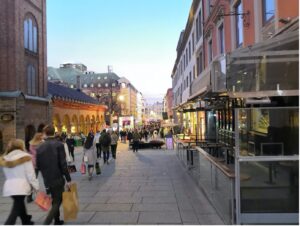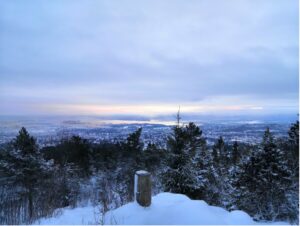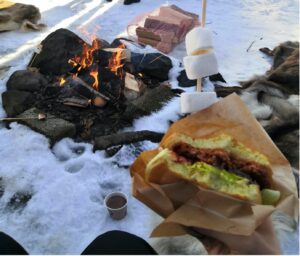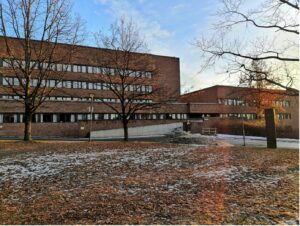Archive for April, 2022
My research stay in Oslo
- Chemistry M.Sc.
- Norway, Oslo
- Universitetet i Oslo
- 12.09.21-12.03.2022
Over the course of my studies, played with the idea of doing an exchange, though, for various reasons, I never went through with it. With the end of my master’s degree approaching, I decided to make use of this last chance and to complete my master thesis during a research stay at a university in another country. The planning for this started in May 2021, at the height of the second COVID wave. This narrowed my choice of countries down to all of Scandinavia, since the situation there was somewhat calm, though at this point the borders were still closed, and it wasn’t clear when they would open again. Nonetheless, I started planning.
After looking at all the major universities in Scandinavia, I found that UiO (Universitetet i Oslo) and UiB (Universitetet i Bergen) did interesting research that aligned well with my qualifications, but also with skills that I still wanted to acquire or improve. After contacting a professor at each university by e‑mail, Prof. Tilset from UiO was able to accommodate me for an interesting project in the desired timeframe.
At first, I tried to find housing privately on finn.no (Norway’s equivalent to eBay), but as a foreigner, a male, and someone staying for a mere few months, it is very difficult to find a place in shared accommodation. Thankfully, the Department of Chemistry offered to apply for researcher housing for me. Most of the student housing in Oslo is run by SiO (Studentsamskipnaden i Oslo og Akershus), a student welfare organization. Their housing is well-maintained and somewhat modern, though as a researcher you pay 20% more rent than students. Electricity, water, and internet access are included in this. This is still cheaper than the very expensive private housing in Oslo. I paid 4800 NOK in rent for a room with a shared kitchen (6 people), which is about 480 €. Having to pay more as a researcher was a recurring theme for my stay in Oslo, since I mostly didn’t get student discounts. As another bonus, you get housed with other students of Oslo’s universities, so you have ample opportunities to make friends. On the day of your arrival, it might make sense to make use of the hourly Ikea shuttles, which take people from the city centre to one of two Ikea markets (free of charge). This lets you buy the necessities for your room/apartment conveniently. The location and departure schedule can be found on Google Maps.
When staying in Norway for more than 9 weeks, it is mandatory to register with the police, where (if you’re an Erasmus intern as opposed to an Erasmus student) you have to document that you have enough money to support yourself (e.g. savings, the equivalent of 180.000 NOK per year, or less if you’re staying for a shorter time), a valid national identity card/passport and private health insurance. I did not know of the latter, but the worker at the police was kind enough to register

© Heiko Schiefer
me as a student when I showed her the signed agreement of the three parties and proof that I received funding from Erasmus (in my case a bank statement).
Oslo has good public transportation (Metro, Tram, Busses, and Boats), but the normal monthly ticket (800 NOK) unfortunately is constrained to the city limits, which nonetheless should cover most of your trips. Extensions can be bought in the public transportation company’s app, Ruter.
Since you will be paying in NOK, it also makes sense to open an account with a bank that charges no fees for paying in foreign currency, e.g., DKB. Credit cards are universally accepted, so there is little reason to carry cash.

© Heiko Schiefer
For leisure activities, the Norwegians are generally very fond of the outdoors, so popular activities are ice skating, skiing, or hiking, sometimes combined with a picknick. Outdoor equipment can be borrowed free of charge at one of the many Bua’s (a non-profit organization) around Oslo. During the winter, many people sit around campfires around lake Songsvann or atop the Vettakollen mountain. These are also nice places to try and get a glimpse of the northern lights. The Norwegian trekking association (DNT) organizes trips (e.g. mushroom picking or hiking) and rents out cabins for cheap. If going out to eat is more your thing, Oslo Street Food is worth recommending. It’s a cozy food court with lots of selection, but don’t expect to be served large portions.
Here it should be mentioned that the selection of vegetarian food is more limited in Norway than in Germany, and vegan food even more so. If you’re a big partygoer, beware: Alcoholic beverages are very expensive in Norway, and only sold until 8 pm. Anything over 4.7% is only sold in the state-run Vinmonopolet shops. If you’re more culturally inclined Oslo’s many museums might be of interest.

© Heiko Schiefer
Because I did not need to attend any courses, I could focus solely on my research and enjoyed lots of autonomy. The university is generally well equipped. I had my own lab bench and fume hood in a large lab with 5 other researchers (Bachelor/master students, PhDs, and a post-doc), as well as a desk in a shared office. Approximately half of the researchers were Norwegian, the other half from all over Europe. The direction and progress of my research was evaluated in weekly talks with my supervising Professor. In addition to that, there were weekly group meetings and biweekly section meetings, were people would present their research and the rest would give feedback/ask questions. The working climate was very pleasant, and I spent hours talking to fellow researchers about their or my research.

© Heiko Schiefer
In conclusion, my time in Oslo was a great experience, both professionally and personally. I got to do research abroad, acquired new skills, and refined those I already had. I met lots of new people and made friends and memories. While the cost of living is certainly high in Oslo and coming to Norway as an intern is associated with some challenges, the experience was certainly worth it.

